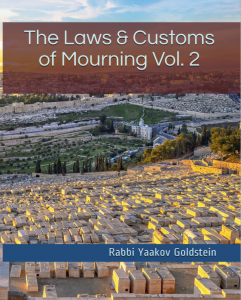
*As an Amazon Associate I earn from qualifying purchases.
Siblings attending the wedding of their brother or sister during year of Aveilus:[1]
Shiva:[2]
It is forbidden for siblings to participate in the Chuppah or wedding during Shiva.
During Shloshim:
The Chuppah: If the sibling will be Mishameish by the meal/Chuppah, he may attend the Chuppah even within Shloshim, even if it is taking place inside the hall.
The meal/wedding hall:[3] If a sibling who is an Avel is Mishameish by the meal, then he may attend the wedding even within Shloshim. He, however, may not eat by the meal and may only eat in a side room by himself.[4] Some, however, rule he may even eat on the regular table.[5] He is not to be present by the meal if he will not be a Mishameish by the meal unless the siblings live together and constantly eat with each other, in which case he may even join the main meal without Shimush.[6]
Music and dancing:[7] The sibling may remain by the meal while soft music is being played, however one is not to be present while fast music is being played.
Shabbos clothing: It is forbidden for the sibling to wear Shabbos clothing [i.e. a Kapata] within the Shloshim.[8] However, some Poskim[9] are lenient.
Year of Aveilus:The Chuppah: If the sibling will be Mishameish by the meal/Chuppah he may attend the Chuppah even within Shloshim, even if it is taking place inside the hall.
The meal/wedding hall: If a sibling who is an Avel is Mishameish by the meal, he may attend the wedding. He however may not eat by the meal and may only eat in a side room by himself. Some however are lenient and rule that he may even eat on the regular table. He is not to be present by the meal if he will not be a Mishameish by the meal unless the siblings live together and constantly eat with each other, in which case he may even join the main meal without Shimush.
Music and dancing: One may attend while soft music is being played during the meal, however one is not to be present while fast music is being played.
Shabbos clothing:[10] It is permitted for one to wear a Kapata for the wedding.
________________________________[1] The leniencies associated with relatives attending weddings during Aveilus is based on two lenience’s found in the Rama; 1) One may waiter at a Simcha, although may not eat at the meal. [Rama 391:3] 2) If the Simcha will be damaged if one does not attend he may participate even in the meal. [Rama 391:2 regarding Yesoma] Depending on the relation, at times the second leniency applies [parents and grandparents] and at times it is debatable if the second leniency applies or if only the first leniency applies [siblings] and at times only the first leniency applies [other relatives] and at times no leniencies apply. [not a relative]. The first recording of an allowance for relatives is brought in the Maharashdam 202; See Nitei Gavriel 16 footnote 10 and in his introduction for a lengthy discussion on this topic
[2] Gilyon Maharsha 391 and 392 in name of Kneses Hagedola in name of Mabit 2:99; Igros Moshe 2:169; See Kinyan Torah 4:121; Nitei Gavriel 16:16-18 and Shut 1 p. 743-764; Pnei Baruch 20:10
[3] Rama 391:3; Gesher Hachaim ibid; Pnei Baruch 20:17; See Maharashdam 202; Pnei Baruch 20 footnote 36
[4] Rama ibid regarding Shamash; Gesher Hachaim ibid; Pnei Baruch 20:17
[5] Nitei Gavriel 16:7; Shulchan Haezer p. 108; See Pischeiy Teshuvah 391:7 and Beis Lechem Yehuda 391:3 that the custom is to allow the Shushvinin to even eat by the meal; See Rama 391:2 regarding one who weds an orphan and see Aruch Hashulchan 391:5; Zera Emes 3:169; Poskim in Pnei Baruch 20:20 footnote 49 that this applies in any case that the Chasan will be saddened if he does not join the meal, however within Shloshim this Heter applies only to an Avel of other relatives.
[6] See Maharashdam 202; Gilyon Maharsha 391
[7] Nitei Gavriel 16:8 and 10 and footnote 13; Teshuvos Maimanis Shoftim 19; See Shaareiy Teshuvah 551:3
[8] Rama 389:3 that from the letter of the law one may wear Shabbos clothing after 30 days.
[9] See Nitei Gavriel 21:1 footnote 1
[10] Rama 389:3 that from the letter of the law one may wear Shabbos clothing after 30 days, although the custom is to be stringent for the first 12 months. Nevertheless, one may be lenient in a time of need, such as the above. [See Teshuvah Meahava Y.D. 389; See Nitei Gavriel 21:1]



Leave A Comment?
You must be logged in to post a comment.